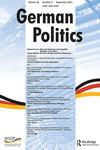The Gendered Effect of Parenthood on Voting Behaviour in the 2021 German Federal Election
IF 2.1
3区 社会学
Q2 POLITICAL SCIENCE
引用次数: 0
Abstract
The effect of parenthood on voting behaviour has so far been largely neglected in electoral research or is assumed to have a negligible effect. However, the 2021 German federal election campaign faced the politicisation of two main family- and children-related issues (i.e. the COVID-19 pandemic and climate change). Based on a comparison of data in the 2017 and 2021 German Longitudinal Election Study, we investigate the gendered effect of parenthood on voting behaviour. Our multinomial logistic regression analysis points to a significant parenthood effect for women during the 2021 election: women with at least one child under the age of 11 have an 8-percentage point higher probability of voting for the Greens than women without children in that age group (controlling among other things for education, age, religiosity and left-right identity). We do not find a similar effect for men. Further analyses suggest that this effect is partly due to a larger importance of climate change issues among mothers of young children. We conclude by highlighting the potential relevance of parents as an electorate force when family- and children-related issues are politicised during electoral campaigns. [ FROM AUTHOR] Copyright of German Politics is the property of Routledge and its content may not be copied or emailed to multiple sites or posted to a listserv without the copyright holder's express written permission. However, users may print, download, or email articles for individual use. This may be abridged. No warranty is given about the accuracy of the copy. Users should refer to the original published version of the material for the full . (Copyright applies to all s.)2021年德国联邦选举中父母身份对投票行为的性别影响
到目前为止,为人父母对投票行为的影响在选举研究中基本上被忽视,或者被认为影响可以忽略不计。然而,2021年德国联邦竞选面临两个主要的家庭和儿童相关问题的政治化(即新冠肺炎大流行和气候变化)。基于2017年和2021年德国纵向选举研究的数据比较,我们调查了为人父母对投票行为的性别影响。我们的多项逻辑回归分析指出,在2021年的选举中,女性有一个显著的父母效应:在该年龄段,至少有一个11岁以下孩子的女性投票给绿党的概率比没有孩子的女性高8个百分点(除其他外,还控制了教育、年龄、宗教信仰和左右身份)。我们没有发现对男性有类似的影响。进一步的分析表明,这种影响的部分原因是气候变化问题在幼儿母亲中的重要性更大。最后,我们强调了在竞选期间,当与家庭和儿童相关的问题被政治化时,父母作为选民力量的潜在相关性。[发件人]《德国政治》版权归劳特利奇所有,未经版权持有人明确书面许可,不得将其内容复制或通过电子邮件发送到多个网站或发布到listserv。但是,用户可以打印、下载或通过电子邮件发送文章供个人使用。这可能会被删节。对复印件的准确性不作任何保证。用户应参考材料的原始发布版本以获取完整信息。(版权适用于所有人。)
本文章由计算机程序翻译,如有差异,请以英文原文为准。
求助全文
约1分钟内获得全文
求助全文

 求助内容:
求助内容: 应助结果提醒方式:
应助结果提醒方式:


